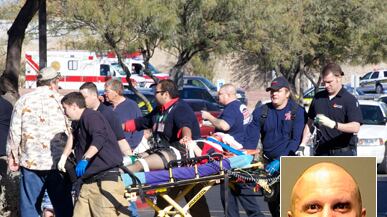Last week the Washington Post broke the story: Jared Loughner's computer contained evidence that, in the days before the shootings, he had surfed Web accounts of execution by lethal injection, conditions of solitary confinement and the denouement of past assassins. Taken together with the cryptic and incriminating handwritten notes earlier recovered from a safe in Loughner's home, as well as evidence that he may have stalked Representative Gabrielle Giffords, having attended a 2007 event sponsored by her, before later shooting her, pundits were armed and ready to conclude that an efficacious insanity defense was drifting away from defense lawyer Judy Clarke.
One former U.S. attorney now in private practice was quoted by The New York Times as saying that the newly discovered evidence "demonstrates premeditation" and that "he intended to kill," not acting on "impulse or as a result of a mental disorder." An unnamed government official told the Los Angeles Times that the computer evidence would "rebuff" defense efforts to show that [Loughner] was "mentally ill" and that he knew that "it was wrong to shoot Giffords and the others." (Clarke has entered a not guilty plea on Loughner's behalf. She is required by law to give notice if she intends to raise an insanity defense, but has not given public indication of her plans.)

It may actually turn out to be true that an insanity defense, in its plain application, would be compromised by the government's new evidence. The core of the present-day insanity defense was imported from England's 1843 M'Naghten case, involving the murder of the secretary to the British prime minister. Although the criteria for finding a criminal insane has been retooled and amended over time (substantially after the acquittal of John Hinckley, the would-be-assassin of President Reagan), the M'Naghten Rule still anchors its current form, focusing on whether, "as a result of a severe mental disease or defect," the accused "was unable to appreciate the nature and quality or the wrongfulness of his acts." "Wrongfulness" in this context does not mean contrary to any penal law—actual knowledge of the law may be relevant but it does not determine the outcome. As one court put it, "wrongfulness for purposes of the federal insanity defense statute is defined by reference to objective societal or public standards of moral wrongfulness."
So, here's the rub. When an accused demonstrates that he is fully aware that his actions are morally wrong, an insanity defense collapses of its own weight. Thus, for example, when a murderer wipes away fingerprints, hides the weapon or takes other steps to avoid detection, such facts alone may destroy an insanity defense. In this vein, Loughner prosecutor Wallace Kleindienst will value evidence that makes it likely that Loughner fully appreciated the nature and quality, as well as the moral wrongfulness of his acts.
With that smile on his face and the far away look in his eyes, mental competence may be in serious doubt.
But the matter won't end with what the investigators have found thus far. What the forensic psychiatrists, both for the prosecution and the defense, will want to know in order to reach a diagnosis is what motivated Loughner's actions. In the M'Naghten's case, M'Naghten was acting under a delusion that the Tory political party was conspiring against him. When M'Naghten shot and killed Edward Drummond, the private secretary, he actually thought he was shooting Prime Minister Sir Robert Peel. Based on his delusional thoughts, the jury found M'Naghten not guilty by reason of insanity.
For Jared Loughner and his defense, the most prominent unanswered question at present is whether he suffered from a delusional disorder. In this limited sense the M'Naghten defense is still available, although procedurally more difficult than it was in 1843. Under present-day law a jury would likely find M'Naghten guilty. Today, with a delusional disorder defense the right versus wrong test is not whether the defendant believed he was justified based on his delusional view of reality, but whether society would objectively judge his actions as an appropriate response to his delusions. Under this test, society would not judge murder an appropriate response to M'Naghten's delusions of being politically persecuted.
On the other hand, if delusional disorder caused Loughner to believe that when he attempted to assassinate Rep. Giffords and shoot the others, he was acting on orders from God, or that the shootings were necessary to save the universe, mankind, or himself for that matter, the insanity defense remains viable. And if delusional disorder is the diagnosis, the recently found computer research evidence loses its punch. Planning and premeditation, even with an understanding that prison or execution may follow, become largely irrelevant if the plans and preparation are formed within a delusional worldview. Insanity and the ability to act in a calculated manner are not mutually exclusive.
For those who fear that Loughner may "beat" the case with some psychiatric razzle-dazzle, fear not. Jared Loughner will be locked away in a secure institution for the rest of his long life. With the dozens of witnesses who conclusively identified him as the shooter, there is no defense that sets him free. There remains the threshold question of whether he is competent to stand trial or to be punished. The insanity defense deals with Loughner's mental state at the time of the shootings. Competency focuses on whether he understands the nature and consequences of the legal proceedings against him or is able to assist properly in his defense. With that smile on his face and the far away look in his eyes, mental competence may be in serious doubt.
At bottom, there are very few successful insanity defenses in the annals of American law. And it is also rare that a high-profile killer is found incompetent to stand trial or to be sentenced. David Berkowitz, the Son of Sam serial killer has been in a New York prison since his arrest in 1977. Mark David Chapman, who murdered John Lennon in 1980 was found delusional but competent to stand trial; he ultimately pleaded guilty after first raising an insanity defense. The examples are endless.
But there is something palpably different about the case of Jared Loughner. It may be that finding Loughner insane or incompetent will work to soothe the American psyche. The unspeakable horror of the Arizona shootings as collateral damage of a political system gone awry; an epic divide between political parties with unrestrained rancor and emotion and an ever present metaphorical and symbolic reference to violence does not serve the nation. Only if Jared Loughner is a disconnected crazy person are we able to assuage our collective feelings of guilt.
Gerald L. Shargel, a member of the New York Bar since 1969, has handled numerous high-profile cases at both the trial and appellate level. He has written written for the New York Times, the Los Angeles Times, the New York Law Journal and the online magazine Slate. Mr. Shargel, a Practitioner-in-Residence at Brooklyn Law School, recently authored a law review article published in the Fordham Law Review, "Federal Evidence Rule 608(b): Gateway to the Minefield of Witness Preparation."






